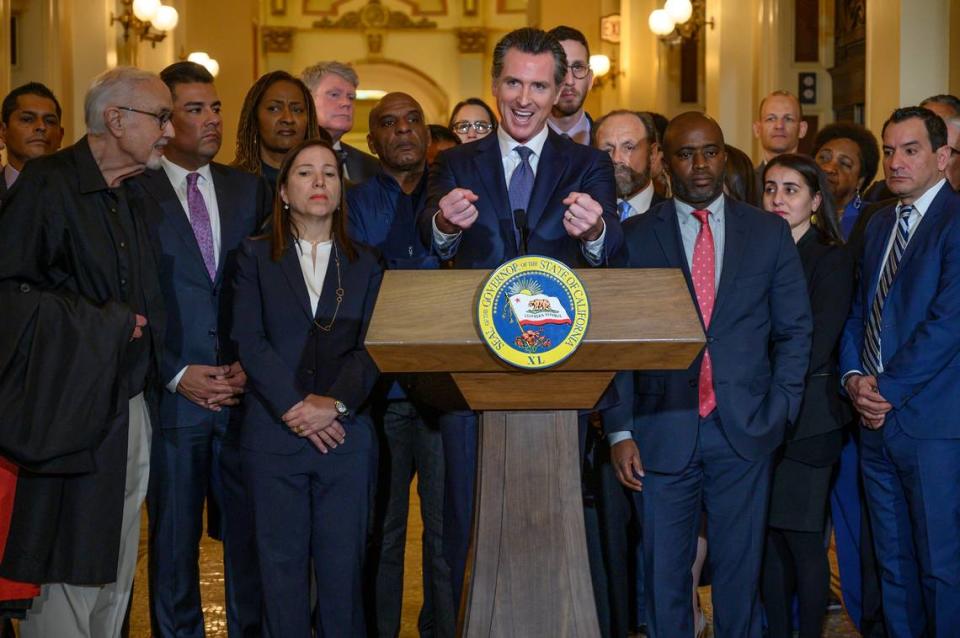California could finally abolish our racist, costly, ineffective death penalty system | Opinion
- Oops!Something went wrong.Please try again later.
More than 70% of the world’s countries have abolished capital punishment in law or practice. In California, however, prosecutors continue to grow the state’s death row population each year, upholding a system rooted in slavery, lynchings and racial inequities that persist to this day.
Since 2019, Gov. Gavin Newsom has imposed a moratorium on executions in California. Even so, 17 people have since been sentenced to death in California — 80% of whom are Black or Latino. All of the individuals in the state who have been exonerated after being sentenced to death, meanwhile, are people of color.
As the elected district attorney and a former judge in Contra Costa County, I cannot fulfill my obligation to seek justice and ensure people are treated with fairness through a death penalty system so deeply ingrained with racial disparities.
Opinion
Luckily, we may finally have an opportunity to end this racist and violent system.
The California Supreme Court is currently deciding whether to take up a historic petition filed in April by a coalition of civil rights and justice organizations arguing that racial discrimination in the administration of the death penalty in California violates the equal protection guarantee of the state constitution. The petition asks the court to issue an order halting the pursuit of death sentences in California, which would prohibit the attorney general and all district attorneys from seeking, obtaining or executing death sentences.
The inequities in death penalty cases have a long history, affecting groups in ways that are more than troublesome. The petition to the state Supreme Court cites more than a dozen studies showing race discrimination. One looked at more than 55,000 homicide cases in California between 1979 and 2018 and found that Black individuals were more than twice as likely to receive a death sentence as white individuals, while Hispanic individuals were 1.5 times more likely to receive a death sentence. That was true even after controlling for variables like felony murder, annual homicide rates, county size and demographics. Another study found that defendants of all races are up to 8.8 times more likely to be sentenced to death when at least one of the victims is white.
Attorney General Rob Bonta agreed in his response to the petition that the evidence of racial discrimination in capital punishment is “profoundly disturbing.”
I support Bonta’s willingness to confront these discriminatory issues and join in his request that the California Supreme Court squarely confront them too. We cannot — and should not — ignore the abundant evidence right in front of us. When discrimination and inequity pervade the administration of the death penalty, there is no equality under the law and therefore there can be no justice.
We should not let voices critical of this petition drown out the facts of this case with disinformation. Some critics will intentionally repeat and amplify the false conclusion that murderers will be let out of prison. But the effects of such campaigns are to cause fear, stoke anger and confuse people.
Let me be clear about this petition: No one convicted of murder will get out of prison because of this case. Indeed, the alternative to the death penalty is a life sentence, often with no opportunity to ever apply for parole.
While this case poses no risk to public safety, the public needs to know that the death penalty wastes millions of taxpayer dollars on a racially biased system that has never been proven to deter crime.
If the death penalty is such a deterrent to the most heinous offenses, why has the murder rate been higher in death penalty states than in non-death penalty states for more than 30 years? Moreover, keeping this faulty system in place risks executing the innocent and disproportionately punishing people with severe trauma, mental illness and intellectual disabilities.
We need a statewide remedy to finally address the racial disparities that have always been a part of capital punishment. I urge the state Supreme Court to fully consider the powerful evidence in this case and ensure that the death penalty system can no longer be used as a tool to perpetuate discrimination.
Diana Becton is the elected district attorney of Contra Costa County. She previously served for 22 years as a judge in the county.


